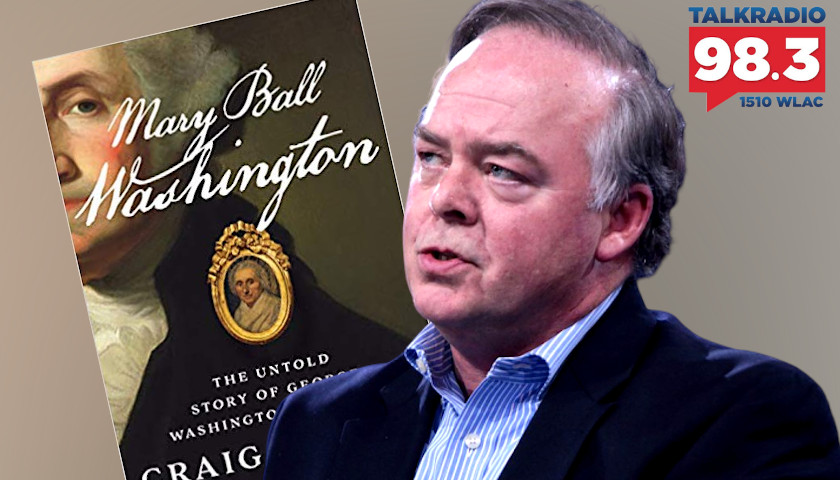In an exclusive interview on Tuesday’s Tennessee Star Report with Michael Patrick Leahy – broadcast on Nashville’s Talk Radio 98.3 and 1510 WLAC weekdays from 5:00 a.m. to 8:00 a.m. – Leahy was joined on the newsmaker line by author, historian, and lecturer Craig Shirley to discuss his recent book Mary Ball Washington: The Untold Story of George Washington’s Mother.
During the second hour, the men discussed Mary Ball Washington’s history and how Shirley felt that he needed to write about the woman that raised the gold standard President, George Washington. He noted throughout the segment how Mary Ball Washington was unjustly represented in American literature and how during an inhospitable time to women in history, she managed to raise five children on her own and the first president of the United States.
Leahy: We are joined on the phone now by our very good friend author Craig Shirley. The premiere Reagan biographer in the country and author of the new book, Mary Ball Washington, The untold story of George Washington’s mother. Good morning Craig!
Shirley: Good morning Michael how are you? Merry Christmas!
Leahy: Merry Christmas and thank you for making this time available in your busy schedule. I was struck reading your book. And I use this word intentionally Mary Ball Washington in her early twenties who had just married Augustine Washington.
Shirley: Augustine.
Leahy: I’m going to read this paragraph and this was about between her marriage and eleven months later when George Washington was born. 1731 or 1732.
“It was during these 11 months that Marry was hosting a friend at her house. There was a dark thunderstorm outside that evening and supper was well underway when a bolt of lightning struck the house. It traveled downward and struck Mary’s guest and killed her instantly. The bolt was so direct that it fused the guest’s flesh and utensils together.”
Shirley: Yes.
Leahy: Now that would have an impact on a person.
Shirley: Yes. And understandably she had an aversion to storms and lightning storms for the rest of her life. Many of us would probably have the same giant fear of electrical storms.
Leahy: Now having read just a little bit about George Washington’s mother, Mary Ball Washington. And frankly, the history about her and the reports are not really all that kind.
Shirley: No.
Leahy: And you decided to look into this? How did you decide to pick her as a subject and what did you find that was different than what has been out there?
Shirley: Well, I’ve always been fascinated by George Washington. I’ve written books for Reagan and worked for Reagan but Washington remains my personal favorite president because of all the things he had to overcome. He was elected commander and chief unanimously.
He was selected to preside over the Constitutional Convention unanimously. He was elected President of the United States unanimously. And then he was re-elected unanimously. Where does a man get those qualities of leadership and integrity, and courage and faith and agriculture, farming and many many careers and many trades?
And all of them good. And he becomes the standard by which all other presidents are measured in every way. And how to conduct themselves. The very title of Mr. President was invented by George Washington. John Adams wrestled for months. His honorable. He who walks on water. (Leahy laughs)
All sorts of honorific titles and then Franklin suggested it was Washington who just said, look it will be Mr. President plain and simple that’s all. Where does he get all of these qualities? They have to be a great deal owed to his mother because his father died when George was 11 years ago. His father traveled often.
No doubt his half brother Lawrence who was from his father’s first marriage had a degree of influence on young George. George really revered him. Lawrence was a very good man but Lawrence also died in his late 20’s early 30’s living in Fredericksburg.
Leahy: Fredericksburg is where George Washington grew up until he was 11 with his father and mother?
Shirley: Yes. He was born over on the northern neck. As a youth, he lived in a dairy farm over in Fredericksburg. And then Mary moved into a house which is still standing today and when George reached maturity and went to fight the Indian War. Then much later settled in Mount Vernon.
Leahy: So Mary Ball Washington was widowed at a very young age. She had how many kids?
Shirley: She had six. She was widowed in her 30s and she had six children in I believe nine years. And the youngest Mildred died in infancy. She was still left to raise as a widow five children in her 30s.
Leahy: And she had some assets. She was in the land of gentry and within that class but sort of at the lower end of it? Was that right?
Shirley: Yes. Precisely. She would be considered to be upper-middle class. But, she was not a member of the class society that George later married into when he married Martha, who came to the marriage as a very wealthy widow after her husband died.
Leahy: What’s unusual about Mary is that she did not remarry after her husband died and she went her own way.
Shirley: Yes, she did. She would have been somewhat of an eligible catch for another widower or middle-aged man. But there’s no record whatsoever of her being sought after or courted or even glanced at. Fredericksburg in 1750, 1760 and 1770 was a small town. And I’m sure that it was pretty common knowledge that Mary could be difficult.
Leahy: She was a handful in other words and very independent.
Shirley: She was a handful, but she had to be. This was a century that was very inhospitable to women. Obviously they didn’t have the vote. But women in the 1700s couldn’t even own property. They were simply expected to be the custodians of property that their deceased husbands would pass along to them and then they would manage it until the eldest son became of age and then they would pass along the property to their son.
So you know, it was a very difficult time. If she was strong as she was I think it was because she had to be strong. Part of the reason Michael I wanted to write this book was that history has been very unkind to her. When she first past away up until the Civil War is that she was depicted in these hagiographies as some kind of Mary Mother of Jesus.
They were really really very poor books. Most of the anthology. After the Civil War you know is that realism took hold in American literature. With Mark Twain and Moby Dick and Red Badge of Courage. And that’s when the literature on her turned as well. And it turned her into a much harder shrew.
A skinflint, mean self-centered selfish all these other superlatives. And she went basically from June Cleaver to Joan Crawford. And neither was really true. There were elements of both in her personality and her character and makeup. But she was neither all Joan Crawford or all June Cleaver. It was a mixture of both.
And as evidence of how Washington felt about her, well there was lots of evidence about how he felt about her because he gave her an allowance to live on and she lived quite well for the rest of her life. It wasn’t like a monthly thing or annual thing but he gave her money when she needed it. And she always had plenty. But he always addresses letters to his mother as Honored Madame.
Which was respectful probably kept her at distance a little bit. But also it did show the respect that he had for his mother. The other was after he was elected President of the United States and before he goes to New York City to assume his duties he makes one last trip to Fredericksburg. And he went frequently to Fredericksburg to check in on her.
Have dinner with her and give her an allowance. To look after his deceased father’s affairs and look after her affairs. He recorded all this in letters. He never kept a diary per se. But he recorded all this. It was fairly frank in the language of that era. But by two contemporaneous accounts this last meeting because she was dying of breast cancer when she was in her early 80s.
Washington was very very tender and very very loving. She had been indifferent to The Revolution. She was indifferent and didn’t really understand him being elected President of the United States. But when he saw her she did give her blessing and wish him well. He departed and then after he went to New York City she passed away.
Leahy: Craig Shirley. Thanks so much for joining us today. I highly recommend this book. I really enjoy how you write. It’s just a great, world-class biography of Mary Ball Washington, The Untold Story of George Washington’s Mother. Our good friend Craig Shirley, thanks so much for joining us this morning.
Shirley: You bet Michael. My pleasure.
Listen to the second hour here:
– – –
Tune in weekdays from 5:00 – 8:00 am to the Tennessee Star Report with Michael Patrick Leahy on Talk Radio 98.3 FM WLAC 1510. Listen online at iHeart Radio.
Photo “Craig Shirley” by Gage Skidmore. CC BY-SA 3.0.





